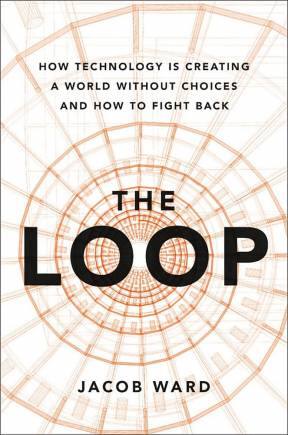



Barring geeks and owners of computer companies, most of us have come to perceive technology more as a source of evil than good. With good reason. We know now the pervasive influence of artificial intelligence (AI) and machine learning through sinister surveillance and arch manipulation. And if we haven’t yet been exposed to it first-hand, the Cambridge Analytica expose and movies like The Social Network have done the documentation quite effectively.
It is this fear and apprehension that author Jacob Ward captures in his book  The Loop: How Technology is Creating a World Without Choices and How to Fight Back. He brings to his thesis an interesting twist.
The Loop: How Technology is Creating a World Without Choices and How to Fight Back. He brings to his thesis an interesting twist.
Early on in the book, Ward explains his Loop “as a downward tailspin of shrinking choices, supercharged by capitalist efficiency, in which human agency is under threat from irresistible systems packaged for our unconscious acceptance.”
A technology correspondent for NBC News, Ward then proceeds to use several proven psychological and sociological theories to establish his basic premise, that our behaviours are not guided by rational thought but are instinctive, controlled by factors that we are often unaware of. The choice of a restaurant or a car or a vote for a political candidate is often based on cues we would be embarrassed to acknowledge.
Among the plethora of studies he cites in support of his assertion is the Austrian psychiatrist and neurologist Otto Potzl’s Pitzl phenomenon, which Ward describes thus: “The study of sight has revealed that what we think we’re witnessing—the unfiltered stream of objects and people and events we see—is actually a wild variety of stuff, some of it perceived, some of it remembered, all of it felt in a way we haven’t fully defined yet.” He also picks on the work of William James an academic whose work in 1884 culminated in an 1899 paper where he concluded “Ninety-nine hundredths or, possibly, nine hundred and ninety-nine thousandths of our activity is purely automatic and habitual, from our rising in the morning to our lying down each night.” There is also the popular Implicit Association Test (IAT) a simple online test that shows our implicit biases in our attitudes to gender, age, race, sexual orientation, disability and body weight.
All this is familiar territory, extensively commented upon and considered a given in any examination of human behaviour. Ward then links it to the increasing role of technology, especially artificial intelligence. Even with this he isn't breaking new ground. Railing against the oppressive role of technology in our lives is de rigueur today. A cursory search for books on the subject throws up a long list, including such classics as Computer Power and Human Reason: From Judgment to Calculation by Joseph Weizenbaum, considered one of the fathers of AI, who warned as far back as 1976 against letting computers make critical decisions since they were incapable of human qualities such as compassion and wisdom.
To Ward's credit, that's not his central postulate. Technology, he argues, is a danger to society because of what we know about human behaviour.
And that's where the book veers from the obvious. The link between the two ideas appears to be a stretch at first glance but the author carefully establishes it by deftly guiding us through the map of psychological studies to show how we are in the grip of artificial intelligence, eager in fact, to accept what it tells us since we have been led to believe that computers and algorithms can be better trusted.
What worries the author isn’t the technology per se, but the way it is shaping our habits, our unconscious tendencies. Thus, pattern recognition technology, so much the rage for its uses in areas like medicine, can so easily send us on a path to alarming discrimination.
Luckily, even a critic like Ward isn’t willing to dump AI. Instead, he explores options to rein it, particularly in terms of profiteering from it, and harnessing it to combat rather than reinforce evils like inequality. Sure, by the end you get the feeling that even the panacea he recommends may be too utopian. In the past too, AI savants have recommended instilling AI with some doses of humanity. Essentially, configure it to behave like a good man with a moral compass instead of a dumb machine without a heart.
Ironically, Ward himself shoots that down by wondering if we even have the underlying universal morality that we want to imbue AI with.
John Ward's The Loop: How Technology is Creating a World Without Choices and How to Fight Back (2022) was published by Hachette.Discover the latest Business News, Sensex, and Nifty updates. Obtain Personal Finance insights, tax queries, and expert opinions on Moneycontrol or download the Moneycontrol App to stay updated!
Find the best of Al News in one place, specially curated for you every weekend.
Stay on top of the latest tech trends and biggest startup news.